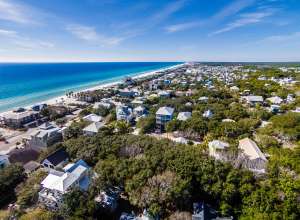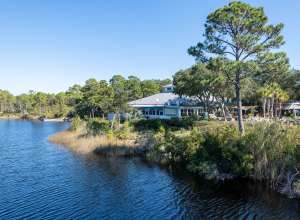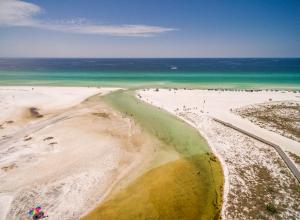Story
Dave Rauschkolb Going Green on Scenic 30A and Beyond
April 17, 2012 by Gwen Break
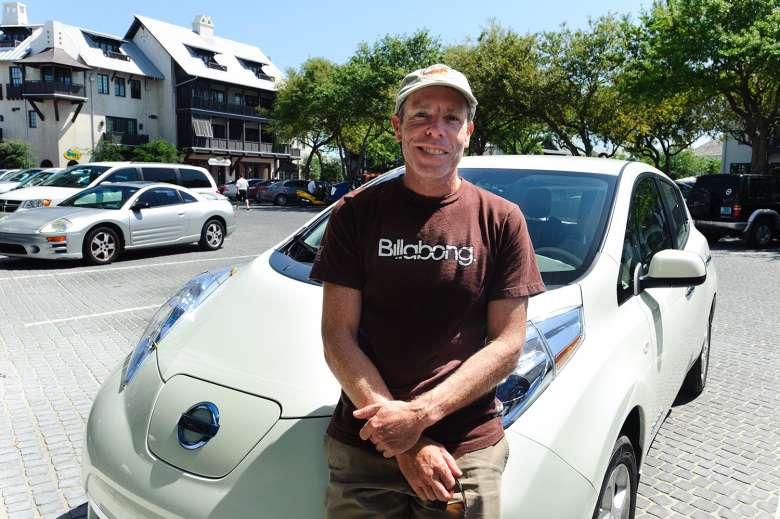
Long-time SoWal resident and entrepreneur Dave Rauschkolb became an “activist against oil” in 2009 when he heard the Florida legislature was considering allowing oil drilling off the Florida Emerald Coast. Rauschkolb was so alarmed at this possibility that he created an opposition force that now reaches across the world. Rauschkolb also has changed the way he lives his daily life to reflect his beliefs.
Rauschkolb began Hands Across the Sand two months before the Deep Horizon Oil Spill in 2010. On February 13, 2010, 10,000 Floridians joined hands on beaches from Jacksonville Florida all the way around the coast to Pensacola. This action was to persuade the Florida Legislature to not pursue a bill to open near shore oil drilling in Florida's waters.
Then, after the Deepwater Horizon Disaster on April 20th, Rauschkolb organized an event on June 25th that brought people together in over 1000 events in total worldwide and in all 50 of the United States. The Hands Across The Sand organization is dedicated to “demand by whatever peaceful means (that) our leaders steer a clear path of logic towards clean energy and steer away from dangerous, dirty fuels.”
During the days after the oil spill, Rauschkolb and his newly formed group were widely featured in the national and international press. It continues to inspire and educate people about the dangers of an oil-dependent economy and world.
Rallying and demonstrating against big oil wasn’t enough for Rauschkolb; he wanted to implement his philosophy in a more personal way. And while he’s not off grid yet, he is able to thumb his nose at big oil interests and simply honk and wave bye-bye when passing a gas station.
Around the first of the year Rauschkolb installed solar panels at his home. Shortly before that he had purchased an all-electric car. He now says he cannot see himself ever buying another gas-powered automobile.
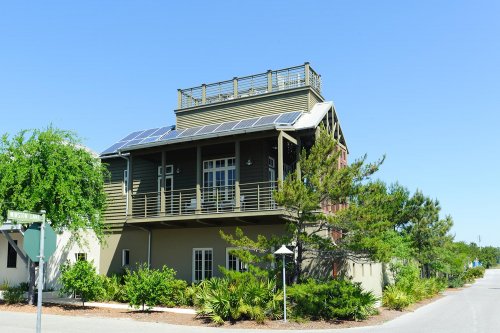
“The first 3,000 miles of my driving this Nissan Leaf cost me $82.50 in electricity costs.”
Rauschkolb estimates his cost for a traditional gas power vehicle would have been five times that amount. ““Even if I don’t have solar panels, this car will cost me about $500 a year to operate as opposed to about $3,000-plus for gasoline costs.“
His car, the Nissan Leaf, is no dinky toy-like car. According to Nissan’s Website the car is a five-passenger, five-door automobile with a top speed of up to 90 mph, and according to Rauschkolb, “is one of the safest cars on the road.”
Rauschkolb said the estimated 100 miles per charge has proven to be accurate and says he has gotten up to 130 miles. He said it is perfect for him to take his daughter to school, go to work, run errands and come home. “I haven’t altered my driving one bit since buying this car in December,” he said.
Rauschkolb traded his BMW Six Series convertible in on his new gas-free wheels, but said he is giving up nothing with his choice. “There’s room for suitcases and golf clubs (all the really important stuff). It has a navigation system, back-up camera, heated steering wheel, all the major conveniences of any other car. It has solar panels on the roof that charge all the electrical. It is the most advanced car on the road now,” says Rauschkolb.
He chose the Leaf because it is 100 percent electric but did shop other vehicles before buying. He considers a hybrid to be a sell-out to the big oil companies – a copout for dealers and drivers who are not yet ready to embrace the future of transportation.
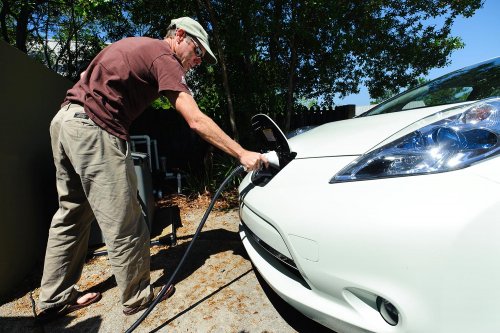
Plus, “There is almost no maintenance. No oil changes and there are very few moving parts. You have to get your tires checked and your windshield wipers changed. That’s it!” he boasted. “The life of the batteries is supposed to be about 10 years. But whatever the cost,” he is quick to point out, “you more than save in gasoline costs.”
When he installed the solar panels, it was to help power his car.
“I wanted to be able to put enough solar panels on my house to power the car. As it turns out, the 5,000-watt system I have will pay for the electricity to charge the car as well as another $500 a year in electricity. So overall, I’ll be saving about $1,000 in electricity. I’ll be saving $3,000 to $4,000 in not buying gasoline (at current prices). I don’t see a down side.”
He said the cost for installing his solar system was $8,200, that was after a 30 percent federal tax break and a $10,000 incentive check from Gulf Power. The system was installed by Entec Sustainable Solutions, which did “a wonderful job.”
“I just drive around with a smile on my face. It makes me so happy to know I don’t have to depend on the oil companies for my transportation needs. It is the most powerful thing I can do as an individual to save money and become less of a burden on our environment.”
Rauschkolb’s activism is an outgrowth of his love for the area and the passion for the outdoors taught to him by his father. Rauschkolb is a long-time surfer and fisherman.
“I just have this incredible passion for our beloved Gulf of Mexico. I believe it is a natural treasure that should be cherished and protected and expanding oil drilling further is pure folly for all of us who live on it and enjoy it as visitors.
I feel that buying an electric car is the most powerful thing we can do as individuals to become less dependent on oil as a transportation fuel. The Nissan Leaf is a perfect second car for local driving and never pumping gas is wonderful! Now, with the Solar panels the thought of driving for free from the Sun is incredible!"
http://www.handsacrossthesand.com
http://www.nissanusa.com/leaf-electric-car
Entec Sustainable Solutions - http://www.linkedin.com/pub/brody-newman/a/b43/6a2




